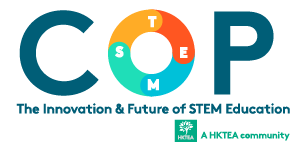CoP STEM
"Innovations in Medical Education: Bridging Theory and Practice through Technology"
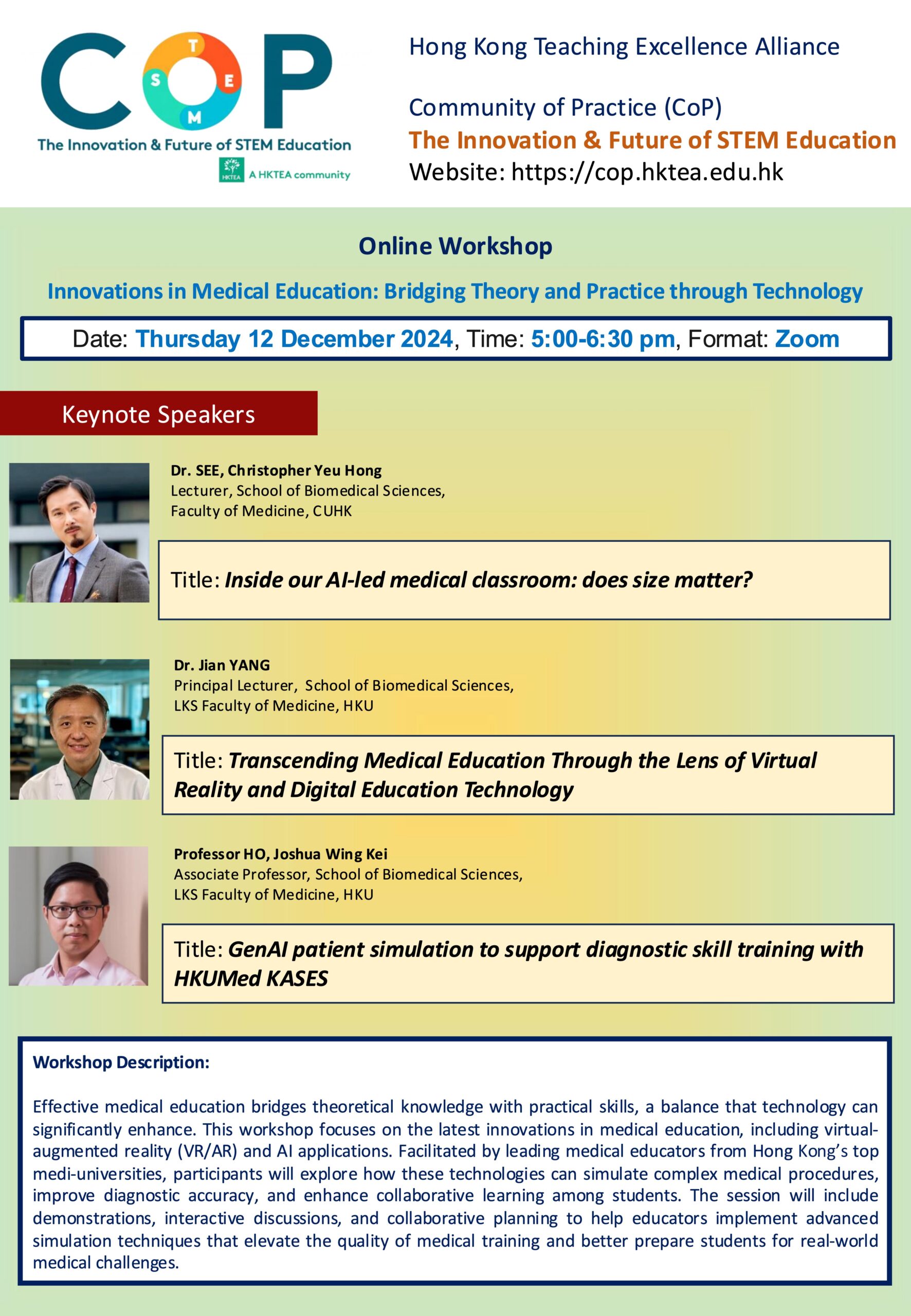
- University account log-in is required.
- Zoom details will be provided before event after successful registration.
- You may experience difficulty in registration if you are using Internet Explorer. Please use the latest version of one of the supported browsers such as Chrome, Firefox, Edge or Safari.
Workshop Description
Effective medical education bridges theoretical knowledge with practical skills, a balance that technology can significantly enhance. This workshop focuses on the latest innovations in medical education, including virtual-augmented reality (VR/AR) and AI applications. Facilitated by leading medical educators from Hong Kong’s top medi-universities, participants will explore how these technologies can simulate complex medical procedures, improve diagnostic accuracy, and enhance collaborative learning among students. The session will include demonstrations, interactive discussions, and collaborative planning to help educators implement advanced simulation techniques that elevate the quality of medical training and better prepare students for real-world medical challenges.
Keynote Speakers
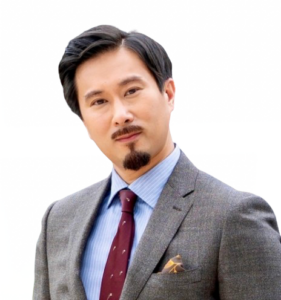
Dr SEE, Christopher Yeu Hong
Lecturer
School of Biomedical Sciences,
Faculty of Medicine,
The Chinese University of Hong Kong
Title: : Inside our AI-led medical classroom: does size matter?
Abstract:
What does a real class run by AI Agents looks like? This talk will share our experience, development process and efficacy findings of the ‘AI Avatar for Every Teacher Programme’ in the Faculty of Medicine at the Chinese University of Hong Kong. We have transformed classroom interactions in medical education by giving AI Avatars a physical presence as 2-meter tall interactive touchscreens. Unlike typical mobile-based chatbots with screen-centric learning, this initiative gives our AI teachers a highly human-like feel, guiding students through branched learning pathways that adapt based on their preparation and choices. By leveraging generative AI for voice, animation and custom LLM integration, yet anchoring learning tasks in human design, the program fosters discussion and divergent thinking. Recognized with significant funding and awards, this innovation addresses student-teacher ratio challenges, enhances learning experiences, and reduces teaching burdens. Our approach emphasizes group interaction over individual device use, transforming the educational experience with AI-driven, peer-led learning.
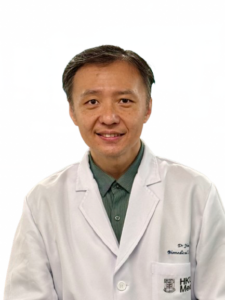
Dr Jian YANG
Principal Lecturer
School of Biomedical Sciences, LKS Faculty of Medicine,
The University of Hong Kong
Title: Transcending Medical Education Through the Lens of Virtual Reality and Digital Education Technology
Abstract:
Virtual reality (VR) technology enables users to immerse themselves in realistic simulated environments, revolutionising the acquisition and application of medical knowledge. The LKS Faculty of Medicine at HKU (HKUMed) has actively embraced VR technologies to create an engaging learning environment for students. By empowering students as partners in learning and assessment, HKUMed has co-created a student-centred and clinically-oriented pedagogy known as VR Enhanced Tasks (VRETs) for the anatomy and molecular biology curricula. This approach transforms traditional teaching sessions into task-oriented, team-based experiential learning experiences that foster communication and peer support.
Our educational study has demonstrated that VRETs enhance students’ learning experiences and efficiency in areas such as motivation, communication, visualization, problem-solving, and deep learning. By partnering with students, we have successfully integrated basic and clinical sciences into preclinical education. Continuously evolving based on educational research and student feedback, VRETs have been incorporated into the formal undergraduate curricula for all healthcare-related programmes. In collaboration with the Hong Kong College of Surgeons, these technological and pedagogical innovations have also been applied to clinical and surgical training for junior surgeons and clinicians. Additionally, the technology and pedagogy developed have been implemented in HKUMed’s newly established TechMezz, a VR/digital technology-enhanced learning space where students can explore medical knowledge outside the classroom.
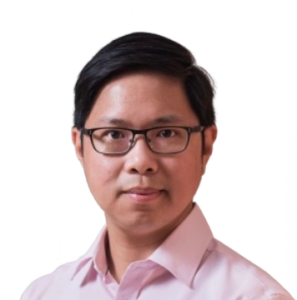
Professor HO, Joshua Wing Kei
Associate Professor
School of Biomedical Sciences, LKS Faculty of Medicine
The University of Hong Kong
Title: GenAI patient simulation to support diagnostic skill training with HKUMed KASES
Abstract
One of the core challenges in medical education is to develop a student’s diagnostic skill. Traditionally students are being presented with written patient cases, in which all the pertinent data are provided in a descriptive manner, which is often quite different from the real-life process in which symptoms, history, and investigation data are gathered in step-wise manner. To enhance the training of a medical student’s clinical reasoning and patient communication skills, we develop an AI-enabled patient simulator called HKUMed KASES (Knowledge and Simulation Education System). Using generative AI (GenAI), KASES simulates a patient’s verbal communication through a chatbot interface and a real-time multi-lingual speech-to-text system. New clinical cases can be readily added to the KASES system by clinical teachers without programming experience. In this talk, we will discuss the design and use cases of the KASES system.
Moderator
Dr Fridolin S.T. TING
Senior Lecturer I,
Office of the Vice President,
The Education University of Hong Kong
Organizer

This event is organised by Community of Practice – “The Innovation and Future of STEM Education”.
